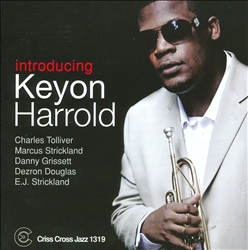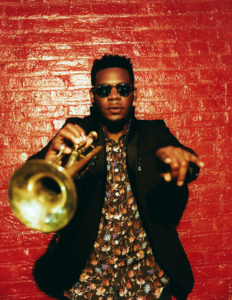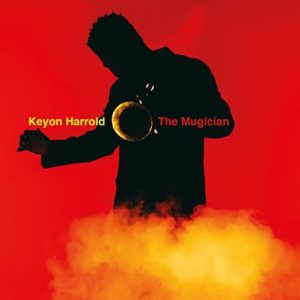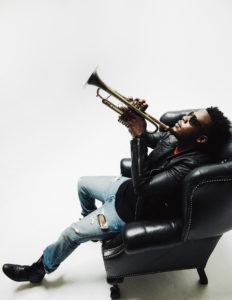SOUND PROJECTIONS
AN ONLINE QUARTERLY MUSIC MAGAZINE
EDITOR: KOFI NATAMBU
FALL, 2020
VOLUME NINE NUMBER TWO
B.B. KING
Featuring the Musics and Aesthetic Visions of:
BRANDEE YOUNGER
(October 31-November 6)
CHRIS DAVE
(November 7-13)
MATANA ROBERTS
(November 14-20)
NATE SMITH
(November 21-27)
T.J. ANDERSON, JR.
(November 28--December 4)
KEYON HARROLD
(December 5-11)
NICOLE MITCHELL
(December 12-18)
OLLY WILSON
(December 19-25)
KENDRICK LAMAR
(December 26-January 1)
JONATHAN BAILEY HOLLAND
(January 2-8)
WENDELL LOGAN
(January 9-15)
DONAL FOX
(January 16-22)
https://www.allmusic.com/artist/keyon-harrold-mn0000931526/biography
Keyon Harrold
(b. November 18, 1980)
Artist Biography by Matt Collar
New York City-based trumpeter, composer, arranger, and producer Keyon Harrold is a talented jazz artist whose adept skills have found him working across various genres from acoustic post-bop to hip-hop and R&B. Born in 1980 in Ferguson, Missouri, Harrold grew up in a musical family along with nine siblings. Initially, he learned to play trumpet as a member of the Memorial Lancers Drum & Bugle Corps, a band founded by his grandfather, who was a police officer. A disciplined musician from an early age, Harrold would practice regularly, sometimes during his school lunch hour, and by the time he finished high school he was an accomplished performer. From there, he honed his skills studying at the Mannes Jazz Program at New York's New School.
https://www.allaboutjazz.com/keyon-harrold-capturing-the-vibe-keyon-harrold
Keyon Harrold: Capturing the Vibe

AllAboutJazz
Beginnings
All About Jazz:
To say that you come from a musical family would be a bit of an
understatement. Can you tell us about your grandfather and how you got
into music?
Keyon Harrold: My grandfather was a
musician. He played the guitar and he was also a singer. My grandfather
and his three brothers used to go on the road and play gigs, they
wanted to be like the Temptations. Once they got back home from being on
the road my grandfather knew that he had to do something so he became a
police officer. He really wanted to do something to help kids so he
decided to start a drum and bugle corps and through that he was able to
impact thousands and thousands of kids. The drum and bugle corps helped
the kids that were growing up in East St. Louis
and Ferguson see life in a whole new perspective. They were able to
learn discipline, learn how to work and get along with large groups of
people and of course learn how to play music. That's pretty much how I
got my start. All of my grandfather's grandkids HAD to learn how to play
music so we are a very musical family. We all had to start out playing
on the horn but my brother, Emanuel Harold actually plays the drums for Gregory Porter.
My grandfather was like "look, we have enough drummers but we don't
have enough horn players—so until that changes y'all have to stay on
horns and then you'll get the opportunity to switch over to drums." I
kept getting better and better on the horn but my brother didn't so he
switched over to drums. My mother and father were both ministers and had
a total of 17 kids and we are all musically inclined along with our
parents so yeah, I come from a musical family.
AAJ: Do you all ever get together and play?
AAJ: What about your son; does he play any instruments or is he even into music?
KH: Yes, my son Keyon Jr. "we call him Bubba" plays the drums, he plays the bass and he also produces, (all this at 14). He's a little cool-vibey dude! (laughs). We record together. He makes music for me, with me and he does stuff with his mom. He naturally gravitated towards music. If I could have him be a doctor or something like that. But music is a part of him, it's in his blood, it's in his DNA.
Sudden Inspiration
KH: Man ultimately the great Miles Davis. His horn (the Moon and Stars trumpet) is right here, I'm excited to play it tonight! Then there's Clifford Brown, Freddie Hubbard, Stevie Wonder and Donny Hathaway. Transition to today's artists and I'm inspired by D'Angelo, the late great Roy Hargrove, Common and Mos Def and even though I've had the opportunity to work with these people they are still my musical heroes.
AAJ: Let's talk about the Miles Ahead movie that you worked on. In that movie Don Cheadle played Miles Davis on screen but you played all the music as Miles; what was that experience like?
KH: It was a beautiful thing! My brother Robert Glasper got called to do the film score "me and him go way back to when we were 15/16 years old" so when he was asked who would be the perfect person to come in and fill the shoes of Miles Davis he was like; "my bro Keyon Harrold. The whole East St. Louis connection, Mississippi River trumpet playing runs deep!"
So it was an amazing experience. I got to play with and learn from the legendary Herbie Hancock and Wayne Shorter. I also met my man Gary Clark Jr. "who later worked with me on album" during that time. It was just a big connection of great people. I'm happy that the Miles Ahead project won a Grammy Award and I can't really think of the right group of words to express the honor that I felt in paying homage to the great Miles Davis. I was pretty much his stunt double in that project.
AAJ: Did you feel a lot of pressure playing that role?
KH: You know what, I didn't. To me it was kind of like when you speak to the people that raised you, your mentors and your parents; you take in so much of what they say and how they say it that after awhile you start talking like them and REALLY understanding where they're coming from. So it was the same when the Miles Davis opportunity came around. It wasn't like I had to go home and practice or anything. I was like I know Miles' music, I've been soaking it in forever.
Circus Show
KH: I was working with this amazing lady, Andrea Pizziconi, we were working on cause-related music for our company, (Compositions for a Cause) where we do a lot of different stuff for refugees and different causes for everything that's going on in the world. We were watching the news and it was right around Trump's election and we were like "Can you believe what's going on? And what the hell is going on?" It was like a circus show. What was happening just seemed unbelievable.
I called up Gary Clark Jr. and we recorded the song and it was a match made in heaven. Now that I think about it with all of the things that have happened since then we should actually do a remix! We didn't go deep enough because all of the craziness that has happened since then makes me realize that we didn't go deep enough.
When Will It Stop?
KH: I have not had the opportunity to meet Mike Brown's family yet, that's something that I would love to do and I'm sure that it will happen one day.
Coming from Ferguson and being from Ferguson and having walked down those same streets that Mike Brown walked when I was growing up made it that much more painful. To see the strip where I used to get my haircut and the McDonald's that I used to walk to and to see my hometown all of a sudden on fire on CNN was just numbing. It pretty much ushered in a new era of racism in the United States. Racism has and will always be here, "it aint going nowhere" but that brought it to the forefront, helped spark the Black Lives Matter movement and forced us to start having real conversations about race.
I'm the type of person that wears my feelings on my sleeves at all times. I can't just get up and play or feel comfortable playing a set without getting up and talking to the people about what's going on with me, what's going on with the people or what's going on in the world.
I feel like it's our job as artists to really, really reflect what's going on and if you can't do that, I don't know maybe you should just listen to music from the past or something. Again, I feel like our jobs as musicians is to be the newscasters of sound so I wrote (MB Lament) as a tribute to Mike Brown because it really affected me.
Having a son I know how I felt when he had to go to the hospital for the first time but I can't even imagine the feeling of him never coming home or laying out in the street like roadkill. That really touched me so I wrote that song in homage to Mike Brown and to his family and in fact to all of the people across the country that have lost their lives for no good reason through police brutality.
Ferguson is home. I was there recently doing an event for a nonprofit organization called Ladies in Hardship. So no matter where I may live Ferguson will always be home.
Vibes & Stuff
KH: When I play I go "wherever" the vibe takes me. Sometimes I might write something and I'm thinking about the technical chords and the inner workings of a song. After awhile I get to a place where I've either played it enough or the musicians around me will help me go to a place where I'm pretty much in a trance. I don't even think about the chords. I'm making sounds, I'm making statements, I'm communicating. I'm communicating with the band, I'm communicating with the audience and its just like being in a portal where I'm just "there." Like I'm experiencing an out of body experience just hovering over reality.
Sometimes I can get together with some cats that can get me there more often than not and that's what you want. Life is a journey and I've played some of my songs thousands of times but each time I play them it's a new experience. You're going to hear something else, you're going to feel something else. A lot of that depends on what type of energy I have coming into the performance. Maybe I came in happy, maybe I heard some terrible news right before you stepped in the door. Sometimes I play from a happy place and sometimes I play from a place of just utter disgust. You just never really know and that energy is the thing that separates people. Can you plug into that portal that takes you somewhere else? It aint nothing but twelve notes but how you use them and tap into your emotions is where the music is made.
Next
KH: I've vibed with a lot of different artists on their projects so now I'm looking forward to a lot of those same people working with me on my projects so it's different. Like Nas, I've collaborated with him a bunch of times but now I want him to be on one of my songs. I would love to work with Radiohead, that would be dope. There's a lot of different people I would love to collaborate with on different levels. Beyoncè, Jay-Z, Maxwell—I've done their stuff, wrote music for their projects and played for them so to have them help bring life to one of my songs would be dope and is something that I'm trying to make happen! So the new record is going to have some nice, nice vibes! It's an out of space, kind of odyssey type of thing and I'm definitely excited about it!
AAJ: When can we expect a new Keyon Harrold album to drop?
KH: The new album is coming soon! Hopefully early May and I plan on touring and hitting places across the country that I haven't had the chance to play yet.
AAJ: I know the COVID-19 has caused you to cancel and reschedule a lot of gigs, what are you doing to stay busy and possibly supplement your income?
KH: I'm doing lessons online and going live on instagram so the people out there can definitely vibe with me on instagram @keyonharrold.
Photo credit: Keyon Harrold. Aaron Paschal
Keyon Harrold: The Mugician
Thankfully, two tracks were saved, one of which ("Wayfaring Traveler") serves as a highlight of Harrold's latest album, The Mugician. The rhythm section provides a solid framework that recurs throughout the release, alternating with zeal between two harmonies in a technique which reveals Harrold's hip-hop roots. The melody rings in the ears long after the album's conclusion, while Harrold's trumpet glistens celestially above, sitting so far behind the beat as to flirt with a different time signature entirely.
While many modern musicians shy away from tackling the febrile world of politics, Harrold revels in it. His song "Circus Show," which features Gary Clark, Jr. on vocals, leaves little room for interpretation, castigating America's desire to build a "crazy wall" against the refrain, "what the hell's going on?" The title "Circus Show" itself offers a fitting commentary, evoking something fantastical and darkly comic.
Just as Bobby McFerrin opened many ears to the possibilities of the human voice, so Harrold can generate sounds that have no business coming out of a trumpet. Over the voice of American singer-songwriter Bilal on "Stay This Way," Harrold employs an array of howls and whines to delineate his own narrative inspired by the happenings below, elevating the vocal lines to a realm words cannot reach. In "Voicemail," Keyon dexterously builds the music around an inspiring phone message left by his mother to form something that would not feel out of place in a Nike ad.
Harrold spent years working his way up through the industry as a respected sideman to the likes of Eminem, Beyoncé and{Jay-Z, committed to, in his words, "making other people sound wonderful." His first solo album in eight years marks his graduation from sideman to leader, assisted by the wave generated by the film "Miles Ahead" for which Keyon dubbed Don Cheadle's trumpet. Although a protégé of Wynton Marsalis, he and Harrold are different players. Keyon blends the reflections of Miles Davis with the attitude of Christian Scott aTunde Adjuah to form something relevant and cool. And it is this sound, honed yet raw, that announces Keyon Harrold onto the scene, not as a sideman, but a serious player among equals.
Track Listing
Voicemail; The Mugician; MB Lament; When Will It Stop?; Wayfaring Traveler; Stay This Way; Lullaby; Her Beauty Through My Eyes; Ethereal Souls; Broken News; Circus Show; Bubba Rides Again.
Personnel
Keyon Harrold: trumpet; other unlisted musicians.
Album information
Title: The Mugician | Year Released: 2017 | Record Label: Legacy Recordings
https://www.keyonharrold.com/about/
Keyon Harrold was born and raised in Ferguson, MO, the St. Louis suburb that tore into America’s national consciousness in 2014 with the police shooting of Michael Brown and the bitter protests and riots that followed. While Ferguson looms large in Harrold’s album The Mugician, it examines our troubled times through a far wider lens than any one tragedy. Sweeping and cinematic, the music draws on elements of jazz, classicval, rock, blues, and hip hop to create something uniquely modern, unmistakably American. Guests including Pharoahe Monch, Gary Clark, Jr., Big K.R.I.T., Guy Torry, Georgia Anne Muldrow and Robert Glasper add to the record’s eclectic nature, but it ultimately triumphs as a unified, cohesive whole both because of Harrold’s virtuosic skill as a trumpeter and songwriter and because of his relentlessly optimistic belief in brighter days to come.
Harrold grew up one of 16 children in a family that prioritized music and community across generations. His grandfather was a police officer who retired from the force to found a drum and bugle corps for local youth, both of his parents were pastors, and nearly all of his siblings sing and perform music today. Culture shock hit Harrold hard at 18, when he left Ferguson for New York City to enroll in The New School. In New York, he landed his first major gig with Common, an experience which he says broadened his musical horizons beyond jazz to include funk, Afrobeat, R&B, and hip hop. Soon he was performing with stars like Snoop Dogg, Jay Z, Beyonce, Rihanna, Eminem, Maxwell, and Anthony Hamilton.
In 2009, he released his solo debut, Introducing Keyon Harrold and then won wide acclaim for his trumpet performances in Don Cheadle’s Miles Davis biopic Miles Ahead. The Mugician is a portmanteau of “musician” and “magician, a nod to a nickname Cheadle bestowed upon the young virtuoso, and it’s an apt descriptor for a record that pushes beyond the traditional boundaries of jazz trumpet. In fact, the album doesn’t even begin with trumpet, but rather with a track called ‘Voicemail,’ which features an inspirational message from Harrold’s mother set to a stirring, orchestral soundscape. Entirely unedited, her words lay the groundwork for an album that celebrates the importance of family (ten of Keyon’s siblings appear on the record) and the absolute necessity of optimism in the face of darkness and doubt. These days, Harrold is a parent himself, and he pays tribute to his son with a pair of tracks on the album, “Lullaby” and “Bubba Rides Again.” Issues of identity and equality percolate throughout the record, sometimes subtly beneath the surface, sometimes more pointedly, as in “Circus Show.” However, the album’s most powerful moments come with the one-two punch of “MB Lament” and “When Will It Stop,” songs written in the wake of Michael Brown’s death and the senseless killings of so many others like him.
It’s a monumental task, one that calls for tremendous empathy and sensitivity. To give voice to the silenced requires more than just talent and ambition, it requires faith, imagination, strength, and determination. Above all, it requires perspective. Fortunately, that is what Keyon Harrold brings most of all.
https://www.billboard.com/articles/columns/pop/7964552/keyon-harrold-new-song-the-mugician-album
Keyon Harrold Is Equal Parts Music and Magic on 'The Mugician': Exclusive

The Mugician may be Keyon Harrold's sophomore release, but it's not his second album.
The trumpeter, who has worked with Beyonce, Eminem, Jay-Z and others -- and, most notably, with Don Cheadle on the Miles Davis film "Miles Ahead" -- actually had the follow-up to 2009's Introducing Keyon Harrold "pretty much done" during October of 2015 when a thief broke into his car in New York, taking his laptop as well as seven hard drives with material from throughout his career. But Harrold didn't break stride. Rather, he saw the theft as a sign from above.
"It was the kind of thing where I could either cry and get super-depressed or say, 'Y'know what, the universe says that wasn't supposed to come out,'" Harrold tells Billboard. "A lot of the songs were about heartbreak and stuff like that. I had just gone through a relationship, a divorce or whatnot, and my life was kind of up in the air and I was basically airing out those feelings on that record that didn't come out. I look at it as God saying, 'I need you to approach it in a different way.'" Meanwhile, none of the stolen material has surfaced anywhere.
"I'm pretty sure whoever took it didn't know what they were getting," Harrold says. "It comes up anywhere over the next couple of years, if someone turns up these songs, it'll be great. But at that moment it wasn't what it was supposed to be."
Harrold was able to save a pair of tracks, "Stay This Way" and "Wayfaring Traveler," for The Mugician, 12 track set that comes out Sept. 29 with a guest list that includes Robert Glasper, Bilal, Big K.R.I.T., Gary Clark, Jr., Pharoahe Monch and more. The rest of the material was created fresh, and "The Mugician" track came from a pre-panel discussion breakfast with Cheadle while promoting "Miles Ahead."
"Don and I were having a muffin, just talking, and he was saying, 'I really appreciate you. You did a great job on your role in this movie. It was pretty magical, like you're a magician,'" Harrold recalls. "I was like, 'What?' Then we started this wordplay about musician-magician, and when we got on stage (at the panel discussion) Don introduced me as 'the mugician.' And I thought about it and said, 'I'm gonna have to write something along those lines...'"
The track itself is a bit of a sonic hodgepodge, with licks echoing Davis and a reggae element courtesy of The Wailers' Josh David Barnett. "I had to be very creative and I wanted it to be aggressive," explains Harrold, who played parts for both Cheadle's Davis and Keith Stanfield's Junior. "That's what working on (the film) was for me; It was aggressive and it was my own thing. As much as it was about Miles, it was also about me being myself as well. The character Junior was basically the way I played, so I wanted to approach ('The Mugician') this way."
Harrold will be touring to support The Mugician, both immediately around its release as well as during the early part of 2018. After eight years he's happy to have another album out under his own name, and he's certainly feeling the push created by "Miles Ahead."
"It's definitely something that helped propel me to another place," he acknowledges. "I've been working in the industry for a very long time with so many different people. I've always had that credibility as a player but it was finally a time where I was able to close a chapter, pretty much, and really go forward in my own career vs. making other people sound wonderful. That's great to do, but I think it's my time now."
Check out the title track from The Mugician ahead of it Sept. 29 release via Legacy Recordings/ Mass Appeal Records below.
http://australianjazz.net/2019/11/keyon-harrold-art-meant-make-people-uncomfortable-realness/
Keyon Harrold: ‘Art is meant to make people uncomfortable with realness’

Every jazz player in the world has studied Miles Davis, transcribing solos, studying arrangements and phrases, in their quest to master their instrument – but how many can claim to have actually got into the Man with the Horn’s shoes (or rather, horn) and try to play like he would? Rising jazz superstar Keyon Harrold did just that, as part of working for Miles Ahead, the controversial biopic directed by and starring Don Cheadle, gaining the nickname ‘Mugician’ (more on that later). Still, there is much more to Keyon Harrold than that – having cut his teeth performing along some of the leading contemporary urban music artists of our time, he has developed a distinct sound and a voice of his own – and he’s coming to Melbourne to showcase it.

What are you going to present at Bird’s Basement?
I am going to present the music of my album, The Mugician; a work born of heart and soul, and of family and love. It is jazz but not only jazz. It is hip hop and rock, but not just that. It is a cacophony of vibes that span soul music. On keys I have Shedrick Mitchell, on bass I have Dominque Sanders, on guitar I have Nir Felder, and on drums I have my Blood Brother, same mother and father, Emanuel Harrold.
What does it mean, being a ‘mugician’?
Being a Mugician is being a magician of music, coined by the amazing actor and also the director of the Miles Davis biopic Miles Ahead, Don Cheadle. He nicknamed me, calling my roll in the film nothing short of magical.
To me, the word ‘Mugician’ has taken on a deeper meaning. I feel like my band and I are shamans of sound; raising the listener’s spirit and vibrations.
You are one of the leading representatives of a new generation of jazz artists, who are incorporating r’n’b and hip-hop elements into their music, along with cinematic soundscapes and other influences; how would you describe your approach to music-making?
I am a musical sponge! I love dense harmonic soundscapes and I love melody no differently. So, I steal elements of what I have listened to; my musical DNA… Dilla, Duke Ellington, Imogen Heap, Steve Aoki, Nas, Mahler, to Miles, Coltrane and Clifford Brown. I stitch new sonic quilts from my musical journey.
<a href="http://keyonharrold.bandcamp.com/track/her-beauty-through-my-eyes">Her Beauty (Through my Eyes) by Keyon Harrold</a>
How has your experience working with artists like Common been?
Working/ collaborating with artists like Common, Nas, D’Angelo, Cirque Du Soleil, Erykah Badu, PJ Morton, Robert Glasper, Georgia Ann Mouldrow, and Pharoahe Monch is always inspiring because for me it has always been good energy, creative vibes and a seemingly never-ending innovative trek they all are on. It keeps the world vibrating. I have decided to take that train artistically as well!
Your music is what I would describe as ‘jazz for the #blacklivesmatter era’; do you agree?
My music is Jazz for social consciousness, it is music for #blackLivesmatter but not only that. It is music for white, brown, yellow, and purple lives too. I want my music to stir people of all races, creed, age, orientations… to be an empathic elixir to life.
What is your take on the role of art – and jazz in particular – in the current political context?
The role of art is to educate. To cast a light where darkness is. Art is meant to make people uncomfortable with realness at times, and I use my artistry at times in that very way. Through convictions and truth, music can give a voice to [those] marginalized. Jazz/music can just as easily show that our differences are what makes us beautiful and strong.
Music is my voice! And it is powerful in that I can serve as a conduit to denounce and call out hate, racism, bigotry and homophobia; all of which is used as divisive tactics. In the end, despite our differences, we are one people.
You have written one of the – very few – songs to address the refugee crisis; what urged you to do it?
I wrote a song called ‘Running – Refugee Song’ that features the amazing Gregory Porter and Common as a way to shed light on the refugee issue. The content of this song will always be relevant because there is always a situation of refugees in the world. My heart is one that can see how others may be feeling. After seeing images of people washed ashore, I was moved to compose ‘the Refugee Song’.
Who are your heroes?
My heroes are many! The first and foremost or my mother, who now watches over me and my father. They taught me humanity; to love.
Quincy Jones, Basquiat, the Beatles, Nelson Mandela, Mozart and Hugh Masekela, James Baldwin, Maya Angelou and Barack Obama, Miles Davis, Stevie Wonder, Chaka Khan, the Bee Gees, Albert Einstein, Roy Hargrove, Wynton Marsalis and Fela. Too many to name! I can go on and on about these world changers.
You grew up in a large family; how has this influenced you as an artist?
Growing up in a family of 17 most certainly taught me how to share, even when I didn’t want to. It also showed me how to find my own nook inside of a large group; being able to maintain my own views as an individual while being a part of the whole.
Jazz is like that to me. A family, many people share the name but are very different stylistically. The subtle and not so subtle differences are what distinguishes.
How did you get into jazz?
Jazz was always around me. My grandfather had us listening and performing music from Count Basie and Tito Puente from before I could walk and talk. He let me know that a cousin of his, Eddie Randall, had a big band in St. Louis, Missouri. Miles Davis got his start in that band, as one of the Blue Devils. In short, jazz and music in general was always in the house.
I fell in love with the music as I started playing the trumpet. Listening to the jazz station, then buying as many albums as I could. By 12 years old I was transcribing Maynard Ferguson, Cat Anderson, Clark Terry, Miles, Freddie Hubbard, Lee Morgan, and Clifford Brown. I didn’t have a teacher show me that Jazz is/was a language. I taught myself by listening and emulating the masters. And the rest is history.
Which tune best describes your current state of mind?
The tune from my album that best describes my state of ming is Voicemail. It features my Mother. A message of hope that invokes inspiration every time I hear it. Keep pushing forward, no matter what!
Keyon Harrold is playing at Bird’s Basement from Wednesday 6 to Sunday 10 November
LISTEN
https://theartsdesk.com/new-music/10-questions-trumpeter-keyon-harrold
Reviews, news & interviews
10 Questions for Trumpeter Keyon Harrold
Acclaimed trumpeter discusses crossing genres, speaking out and Miles Davis
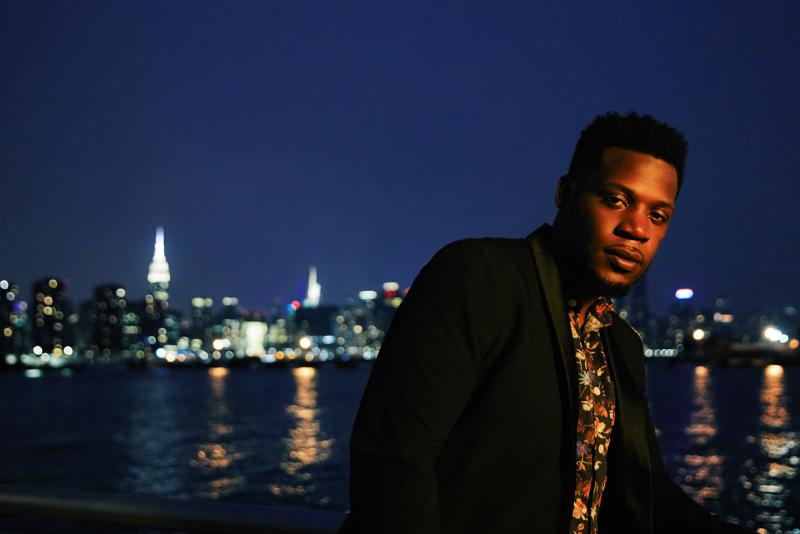
Trumpeter Keyon Harrold grew up in Ferguson, Missouri and studied alongside Robert Glasper at the School of Jazz at The New School, in Greenwich Village, NYC. He has been a sideman with many of the biggest performers in music including Eminem, Beyoncé, Jay-Z, Dr Dre, Maxwell and Common, and recorded two albums in his own name.
His second album, The Mugician, was released last year to great acclaim. With collaboration from artists including Robert Glasper, Bilal, Big KRIT and Pharoahe Monch, Harrold incorporates elements of soul, reggae and hip hop into a transcendent musical statement of hope. On tracks such as “MB Lament”, about unarmed 18-year-old Michael Brown, who was killed by a police officer in Ferguson, Missouri, in 2014, and many more, Harrold comments powerfully on contemporary politics and injustice. He spoke to theartsdesk about music, politics, and the unquantifiable influence of Miles Davis.
MATTHEW WRIGHT: The trumpet sounds on "Stay This Way" are extraordinary. Are they as much fun to play as they sound? Do you need to be a certain type of character to play solo trumpet?
KEYON HARROLD: On “Stay This Way” I try to paint a picture. Colours, sounds, and bursts of a longing for a perfect instance or moment of love. A moment to be encapsulated and remembered as the perfect bliss forever. When I think of my life and what I have gone through, I remember the perfect moment(s) before the fall, the times that I never wanted to end. So my improvisational approach was to reflect the feeling of passion and fire between two lovers.
The Mugician contains hip hop, soul, reggae, as well as jazz. Or am I applying false categories? How do you keep this diversity of music in your head at once?
Music is ultimately a continuum. The main thing that differentiates genres is the beat or the rhythms, as said by Quincy Jones. Ultimately there are only 12 notes so, already, there is a lot of room for overlap between the genres. I am a person who has studied music and respects many genres. So there is no surprise that hip hop, R&B, Afrobeat, reggae, classical music, and gospel music all influence my jazz and who I am as an artist. What you hear on The Mugician is a collage of the music that radiates in my soul.
Your album is, overall, optimistic about the role music can play in society, with many songs such as “When Will It Stop” and “Broken News” that have a direct political message. Do you still believe music can bring about change, even during the Trump presidency?
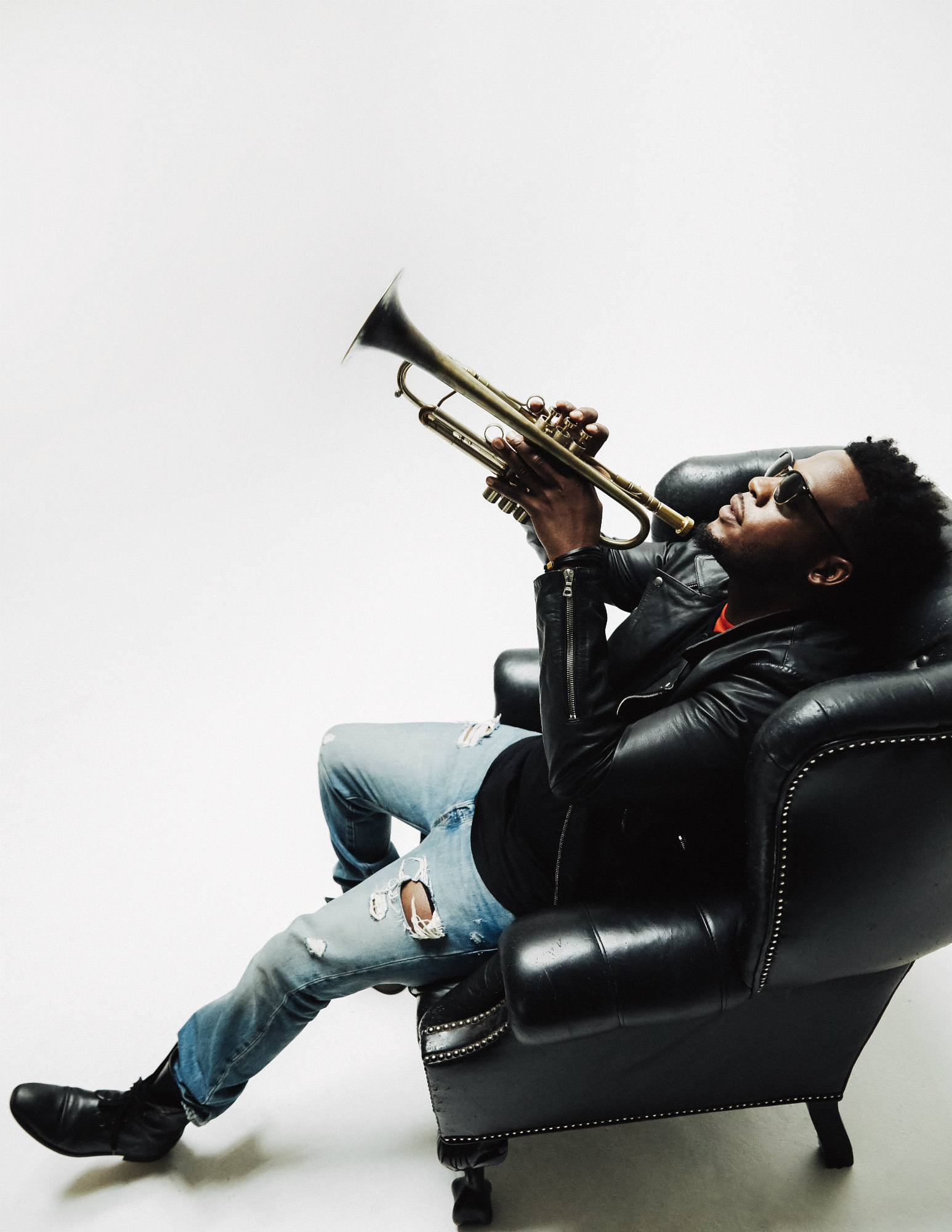
Music is a vehicle to paint the state of our lives. I love to use music as a tool. I feel that my platform is a way to inspire hope and change in people by taking conscious aim at hate and indifference between peoples. It is my job to aggressively speak and create music that highlights issues of poverty, racism, sexism, bigotry, fascism, xenophobia, police brutality, classism, homophobia, and bullying. With songs like “When Will It Stop” and "Circus Show" (featuring Gary Clark Jr, written by myself and Andrea Pizziconi), the idea is to speak up and speak out! The reality is that we do live in the time of an unsympathetic leadership in America. One that has no shame of its separatist ideals. I most certainly intend to use music as a healing force to counteract the hate force in today’s political climate. “Our lives begin to end the day we become silent about things that matter,” as Martin Luther King said.
You grew up in Ferguson, Missouri (near St Louis, home of so many jazz musicians), where unarmed 18-year-old Michael Brown (subject of the song “MB Lament”) was killed by a police officer in 2014. How does a town recover after something like that?
The idea of Michael Brown being killed was an eye-opening event. One that gave birth to powerful movements such as Black Lives Matter. It was the removal of a veil of racism and prejudiced behaviour that exists and has been a fibre of American history. That tragedy was a microcosm of a reality that some people’s very existence are worth less than others. That opened the eyes of many and also opened the floor to an important conversation about racial bias, police brutality, and injustice in America. Ferguson and many other cities will never be the same because of the scrutiny and perpetual findings of the DOJ, that showed proof of injustice to many people of colour. But in all this event has sparked outrage, and many who were not privy to the wrongdoing are indeed marching and speaking out in hopes that tragedies like the untimely death of Michael Brown never happens again.
Your career has followed a more traditional jazz musician’s path insofar as you’ve learnt your craft as sideman in other musicians’ bands (“making other people sound wonderful,” as you put it) before recording in your own name. Is that what you’d recommend to young musicians starting out?
Energetic, soulful, honest, vulnerable and daring; rooted in the history and vernacular of jazz but in no way limited to it
My musical journey has been a path that allowed me to learn and develop from a variety of amazing situations. From my first professional touring opportunity with rapper Common, to Jay-z, to Billy Harper, to Cirque Du Soleil, Maxwell and Dangelo. All have shaped me and added to the message of what I am able to deliver now. I advise younger musicians to study and put themselves in environments that challenge them and enrich them on every level: personally, musically, and financially. Ultimately, one that helps the young artist solidify their own vision. I advise young artists to learn from masters as much as humanly possible.
Did you have a favourite session gig? You’ve played with Eminem, Beyoncé, Jay-Z, Dr Dre, Maxwell, Common, and many more...
A few of my favourite sessions were working on Jay Z’s American Gangster album and Maxwell’s Black Summers Night album. Going to the studio, hearing the art go from demo to final form, and being an entity that moved their vision forward was an honor. To then hear the final versions in the studio loud on the speakers, then in the club or on the radio, is a feeling that I can’t get enough of. That feeling when you see people dancing and loving the art that you created, makes the many sacrifices all worth it.
Wynton Marsalis’ quote that you are the “future of the trumpet” features on all of your publicity material. Is that title a privilege or a burden? What is the “future of the trumpet”?
When Wynton said I was the “Future of the Trumpet”, I was 16 years old. It was great for him to say, but it is for me to define what it means. I am focused on thinking of ways to create new vibes and to give my sound a place In world culture. I want to be someone who brings more people together with the timbre of my horn.
You told Rolling Stone you would rather be known as a “social music activist” than a jazz musician. What do you mean by that?
I mean that the idea of social music is a conscious focus and realisation that music is the soundtrack of our lives. It is above being pigeon-holed as simply a jazz musician. I am much more than that and capable of much more, from the standpoint of being human. Being a father, a friend and an emphatic person. Defining and addressing social issues is prime to me as a role model.
You played Miles Davis’ trumpet in Miles Ahead, Don Cheadle’s biopic, and Miles has always been an important influence. In some ways, your career has picked up on what Miles was doing in the 1980s. What does his influence mean to you now?
Miles’ impact on me is unquantifiable. As an artist and as a player, I have been able to internalise and adopt some conceptual ideas; but not to merely copy, but to use as a launch pad. Miles was always thinking ahead, a visionary. I aspire to run with that notion by continually looking for the next fusions and evolutions of music and culture, that will evoke progressive thoughts and good vibrations.
Can you give readers a preview of the Ronnie Scott’s show? Do you have anything new to preview?
Ronnie Scott's will be a spectrum of feelings and sounds and a show to remember. Performing the music of the new album The Mugician. I feel that I have assembled a great band, one to be reckoned with like one of Mile’s great ensembles, plus some special guests. Energetic, soulful, honest, vulnerable and daring; rooted in the history and vernacular of jazz but in no way limited to it. We are a progression.
Keyon Harrold will be playing at Ronnie Scott’s Monday 2 July to Wednesday 4 July and Walcot House in Bath on Thursday 5 July
Rising star trumpeter Keyon Harrold powerful and political at The Jazz Café
Tuesday, April 17, 2018
JAZZWISE
It seems like every time I pick up a great crossover album at the moment and there's a trumpet player on it that trumpet player turns out to be Keyon Harrold.
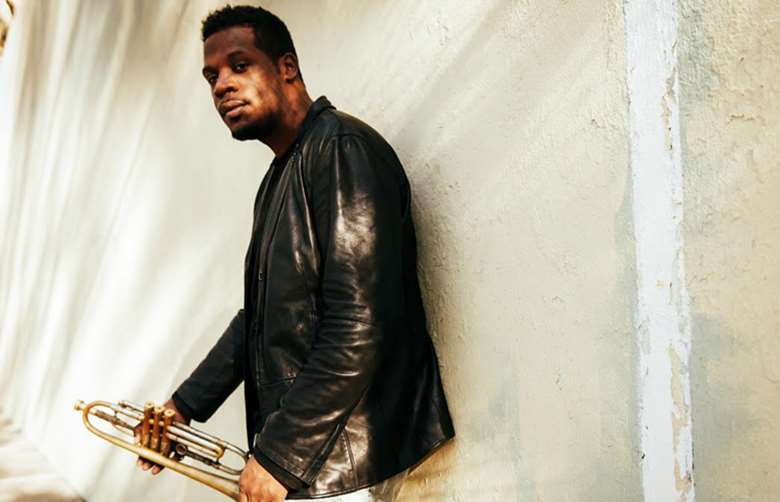
The Missouri-born New York City-based musician is best known for his work on the Miles Ahead soundtrack (he was the trumpet double for Don Cheadle's Miles Davis and his young rival, Junior). But his list of credits is humbling. In the past two decades, he's worked with Jay Z, Maxwell, D'Angelo, Billy Harper and Gregory Porter. And he pops up on a slew of recent recordings, including Common's Black America Again, Chris Dave's long-awaited Drumhedz release and Terrace Martin's Velvet Portraits.
But Harrold is fast becoming a star solo artist in his own right. I enjoyed his major label debut, The Mugician (a nickname and portmanteau coined by Cheadle himself), when it was released last year. Robert Glasper and brilliant vocalist Bilal both feature and there's some gorgeous orchestral writing on there – slicing strings and sonorous bass clarinets. Performed live though, by Harrold's New York trio plus keys player Ashley Henry, a star of the London new wave, it was something else entirely. I didn't realise Harrold's sound was that bold, that his jazz chops were that good or that he could stretch out that far. There's so much feeling in his playing, whether he's crafting mellow lines or hammering out ear-shredding pyrotechnics, you know he means every note.
The set began the way the album does, with Harrold soloing around a voicemail message from his Mum, Shirley, telling him to never give up on his dreams. As an emotionally repressed Brit, I usually roll my eyes at heart-on-sleeve stuff like that. But Harrold played with such passion, I could feel a lump rising in my throat. Though he considers himself a jazz musician at heart, Harrold describes his music as a "gumbo" of different styles. The album's title-track brought skanking reggae; a version of 'In A Sentimental Mood', featuring singer Andrea Pizziconi, sounded like Ellington remixed by Slum Village – all lopsided beats and lowriding basslines; Pizziconi and China Moses added soulful backing vocals to 'Wayfaring Traveler'; and the dreamy 'Stay This Way' became a thrashing rock anthem, with a blazing guitar solo from Nir Felder.
The band were on fire. Henry's playing was more assured and more varied than ever before, and later in the set bassist Burniss Travis opened up, decorating a heavy arrangement of The Beatles' 'She's Leaving Home' with thrumming, high-register phrases that sounded like flamenco guitar. He lived up to his nickname, 'Boom', on fusion burner 'Bubba Rides Again', hammering out a one-note bass groove – a chest-shaking low-frequency piledriver pounding out of the subs. When his time came, drummer Charles Haynes exploded the beat, then brutally and repeatedly stamped on his bass-drum pedal. I love it when drummers play like that: when you know they're not even thinking about complex cross rhythms or related time signatures, they're just smashing things at random. Sometimes the moment demands it.
But this was more than just a great gig. It had impact. It felt important. Harrold is highly political. He runs a music non-profit called Compositions For A Cause with Andrea Pizziconi, and she joined him on stage to sing 'Circus Show', an ode to the ludicrous, terrifying times we live in. The emotional climax was the ballad 'MB Lament', written for Michael Brown, a black teenager who was gunned down by police in Ferguson, two blocks from Harrold's father's home. It was dedicated to all victims of law enforcement "debacles", because "nobody deserves to be killed just for walking down the street". Its mellow, reflective bassline morphed into the head-jolting groove of 'When Will It Stop' and the band, plus guest altoist Soweto Kinch who stormed out of the wings and bit down hard on his reed, unleashed more righteous fire.
On the journey home, I couldn't stop thinking about that photograph taken during the Black Lives Matter protests in Baton Rouge in 2016. Perhaps you remember it. It shows a young black woman in a flowing dress calmly making a stand, alone in the middle of the road. Two police officers in riot gear are closing in on her. She's about to be arrested. But in the split second that the photograph was taken, it looks as if the officers are falling back, overawed. It's like there's a forcefield around her. She looks devastating and untouchable – majestic, even – a beacon of non-violent resistance, radiating grace and power. 'My Queen Is Ieshia Evans'.
In the biggest moments, when Harrold was pouring his heart out, singing the blues through his horn, preaching pride and determination, this performance felt the way that photograph feels. If that picture were a scene in a film, Harrold's music would be playing.
– Thomas Rees
https://www.americanbluesscene.com/twenty-questions-keyon-harrold/
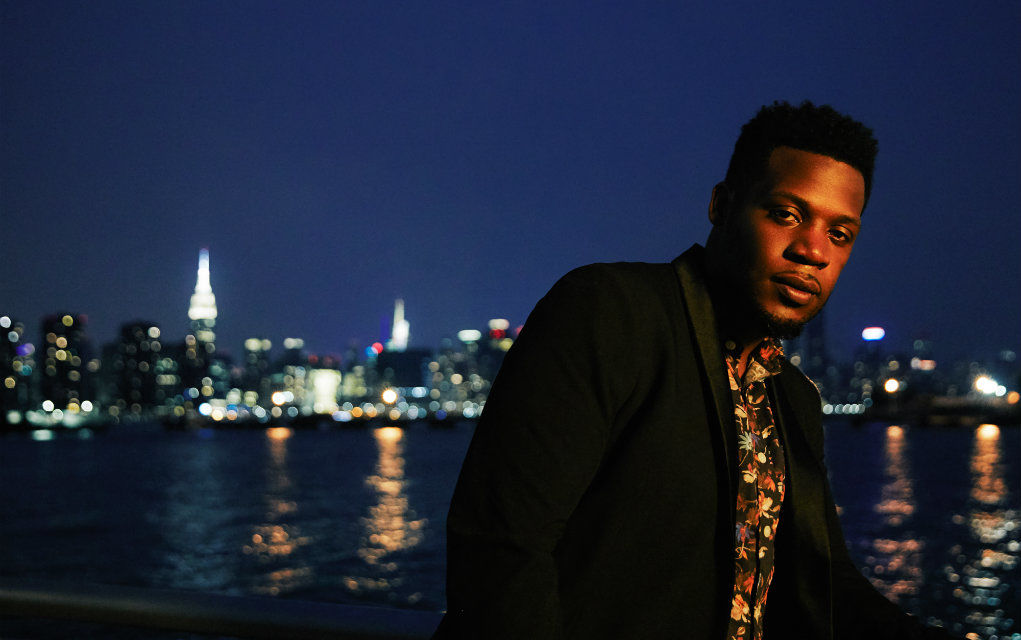
The Checkout Meets Up with Trumpeter Keyon Harrold, Ablaze, at the North Sea Jazz Festival
Keyon Harrold’s beautiful trumpet tone has been heard on many of our era’ s defining popular music, from Jay-Z to Maxwell to Mac Miller.
At the same time, he has carved out a serious solo career, notably with his ambitious album The Mugician.
“It has everything from classical music, to soul, to R&B, to hip-hop, to jazz because it’s all a part of me,” Harrold told me recently. “It’s everything. It’s not just simple quartet, quintet arrangements. It’s orchestrations.”
Harrold grew up the 10th of 16 kids in Ferguson, Mo. At the North Sea Jazz Festival last month, he used the stage to speak out against racism and social injustice — playing “MB Lament,” for Michael Brown, who was killed by a police officer in Ferguson in 2014. Harrold also premiered a new ballad that grapples with these same issues: “Love In Tragedy,” commissioned by the director and actress Anna Deavere Smith. (That song has its broadcast premiere here.)
We’ll also hear Harrold speak about his musical idol, Miles Davis. He played all of the ghosted trumpet parts on Miles Ahead, Don Cheadle’s 2015 biopic. It was a stray comment by Cheadle that gave Harrold a title for The Mugician.
Harrold will perform on the Charlie Parker Jazz Festival at Marcus Garvey Park on Saturday, Aug. 25. WBGO will be there to capture some of the Festival's performances.
Subscribe to The Checkout podcast on iTunes and Stitcher.
Assistant Producer: Anthony Nieves
https://en.wikipedia.org/wiki/Keyon_Harrold
Keyon Harrold
Keyon Harrold, Trumpeter for the celebrated Miles Davis biopic, visits U.K.
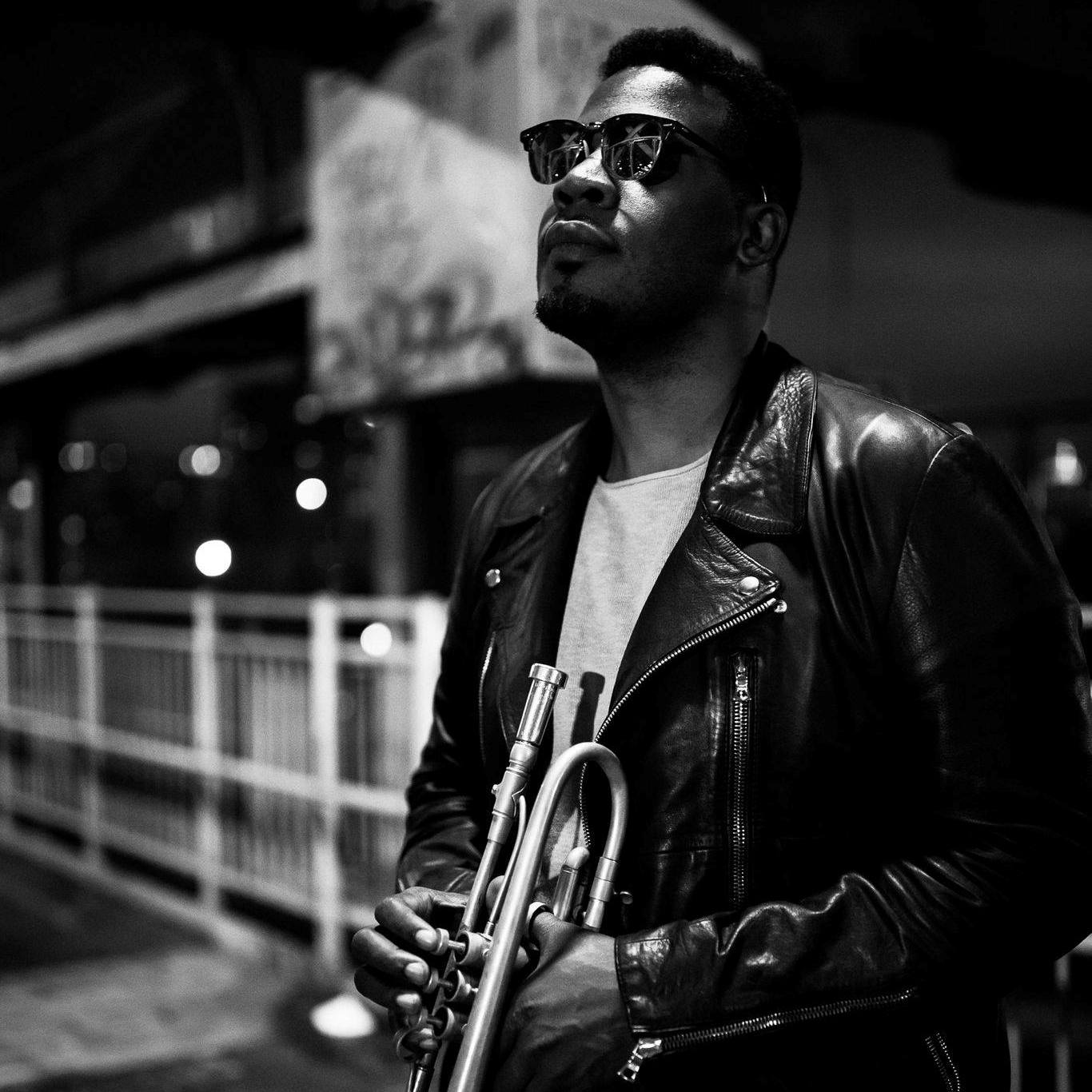
Keyon Harrold is one of America’s biggest new jazz stars, and played all of the trumpet parts in the critically acclaimed Miles Davis biopic ‘Miles Ahead’ staring Hollywood actor Don Cheadle.
July 2018 sees multi-award winning trumpeter Keyon Harrold travel to the UK to play live shows at Soho’s Ronnie Scott’s Jazz Club from 2nd – 4th July and Walcot House in Bath on 5th July, in support of his recent album The Mugician. The album’s title is a nod to the nickname that the critically acclaimed actor Don Cheadle bestowed upon the young virtuoso for his performances in the much-celebrated Miles Davis biopic ‘Miles Ahead’.
Harrold’s music draws on elements of jazz, classical, rock, blues, and hip hop to create something uniquely modern and unmistakably American. Guests on The Mugician include Pharoahe Monch, Georgia Anne Muldrow, Gary Clark Jr., and Robert Glasper to name a few.
Born and raised in Ferguson Missouri, (the St. Louis suburb that gained international attention in 2014 with the police shooting of Michael Brown and the bitter protests and riots that followed), Harrold grew up one of 16 children in a family that prioritised music and community across generations. At 18, he left Ferguson to enrol in NYC’s liberal arts college The New School. In New York, he landed his first major gig with multi-platinum recording artist, actor and film producer Common, an experience which he says broadened his musical horizons beyond jazz to include funk, Afrobeat, R&B, and hip hop. Soon after this he became the go-to trumpet player for a whole host of stars including Snoop Dogg, Jay Z, Beyonce, Rihanna and Eminem.
The Mugician is an album that celebrates the importance of family (ten of Keyon’s siblings appear on the record) and the absolute necessity of optimism in the face of darkness and doubt. The album opens with ‘Voicemail,’ which features an inspirational message from Harrold’s mother, set to a stirring, orchestral soundscape. Later he focuses on the next generation, paying tribute to his own son with ‘Lullaby’ and ‘Bubba Rides Again’.
Some of the album’s most powerful moments come with the one-two punch of ‘MB Lament’ and ‘When Will It Stop’, songs written in the wake of Michael Brown’s death and the senseless killings of so many others like him. While Ferguson looms large on The Mugician, it examines our troubled times through a far wider lens than any one tragedy. Issues of identity and equality percolate throughout the record, sometimes subtly beneath the surface, sometimes more pointedly, as in the track ‘Circus Show’, where Harrold and vocalist Gary Clark Jr trade versus and hooks, castigating the desire of America’s current ruling forces to build a ‘crazy wall’ against the refrain, ‘what’s going on?’
A vibrant range of some of America’s best musicans add to the record’s eclectic nature, but ultimately The Mugician triumphs as a unified, cohesive whole, because of Harrold’s virtuosic skill as a trumpeter and songwriter and because of his relentlessly optimistic belief in brighter days to come.
More information about artist: Keyon Harrrold
Photo Credits: Keyon Harrold FaceBook – and (c) info: all rights go to original recording artist/owner/photographer(s).
YT Video: hypefresh.
Keyon Harrold In Five Collaborations
October 8, 2018 | by Ross Eustis
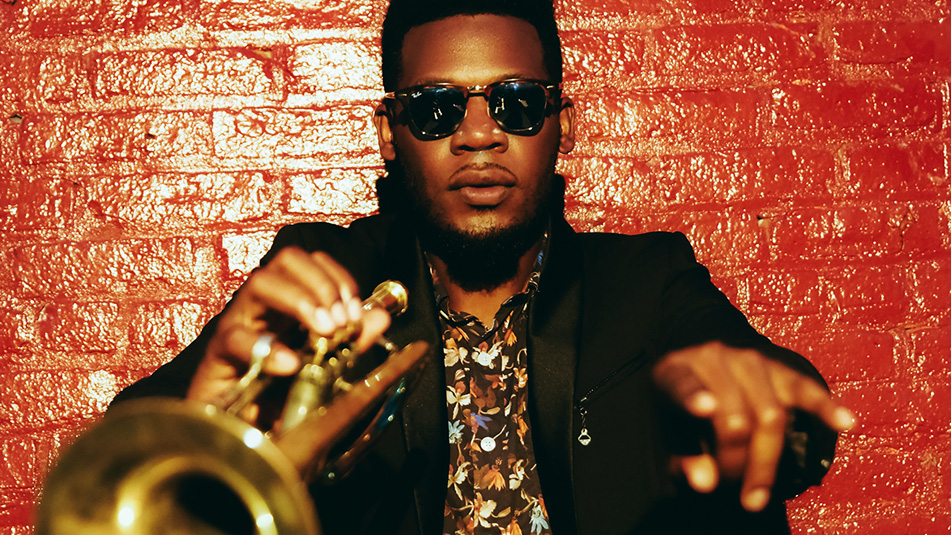
Keyon Harrold (Photo by Deneka Peniston)
Compared to Freddie Hubbard by DownBeat and hailed as “the future of the trumpet” by Wynton Marsalis, Keyon Harrold was mentored by trumpeter Charles Tolliver, landed his first professional horn gig with rapper Common, and has since established himself as an improviser, vocalist, songwriter, producer, and studio ace via his work on recordings by the likes of Jay-Z, Beyoncé, Mary J. Blige, Gregory Porter, and Maxwell. We look five memorable collaborations before Harrold debuts in SFJAZZ's "New Trumpet" series on October 13, on the heels of his solo release The Mugician.
1. Common
"My first professional gig was working with Common... that pretty much changed my career, and how I looked at music." Keyon Harrold has worked with the rapper ever since his Like Water For Chocolate tour in the early 2000s, and the trumpeter performed with Common at a special Tiny Desk concert at the White House in 2016, in a band featuring Robert Glasper and SFJAZZ High School All-Stars alum Elena Pinderhughes.
2. Jay-Z
Harrold performed the trumpet hook on Jay-Z's 2007 hit single "Roc Boys (And the Winner Is)..." off the album American Gangster. Rolling Stone named the song the best single of 2007. For fans of Jay-Z's better half, Harrold also performed the trumpet line on Beyoncé's "Back Up."
3. D'Angelo & The Vanguard
"Keyon!" shouts D'Angelo (at 9:57), right before Harrold takes a blazing solo. D'Angelo's a leading voice of the neo soul movement, with breakout albums Brown Sugar (1995) and Voodoo (2000). After a 10+ year hiatus, D'Angelo made a grand return with the GRAMMY-winning Black Messiah in late 2014. Harrold and saxophonist-producer Kenneth Whalum made up the horn section of D'Angelo's subsequent tour with The Vanguard – one of the greatest live bands you'll ever see!
4. Erykah Badu
For one of his most recent collaborations, Harrold joined singer Erykah Badu for a Tiny Desk concert at NPR Music headquarters in September, 2018 – he's since performed a number of times with Badu. Fingers crossed there's a studio session in the works!
5. Don Cheadle's Miles Davis biopic Miles Ahead
Harrold played all the trumpet parts in Don Cheadle’s 2015 Miles Davis biopic – including Cheadle’s on-screen performances, as well as for the character Junior. The Robert Glasper-produced Miles Ahead soundtrack would win a GRAMMY Award for Best Compilation Soundtrack for Visual Media. The track "Junior's Jam" features Harrold stretching out over an afrobeat groove.
Honorable Mention: Mac Miller
We could easily add a number of Harrold's collaborations to this list, but given Mac Miller's untimely passing on September 7, 2018 at age 26, we had to include Miller's "Stay," featuring a powerful and incredibly soulful horn hook by Keyon Harrold.
THE MUSIC OF KEYON HARROLD: AN EXTENSIVE VIDEO OVERVIEW, A CROSS SECTION OF RECORDINGS, MUSICAL ANALYSIS AND COMMENTARY, PLUS VARIOUS INTERVIEWS WITH KEYON HARROLD:

